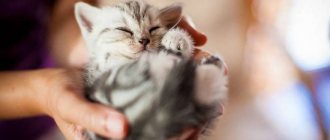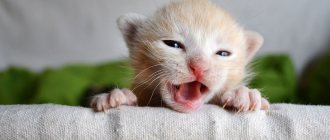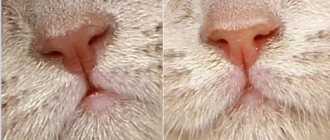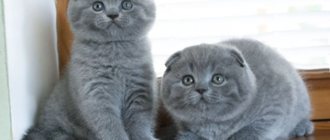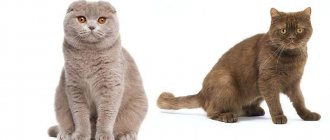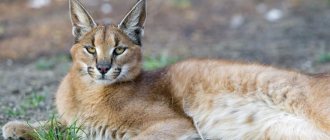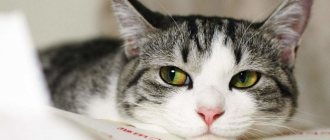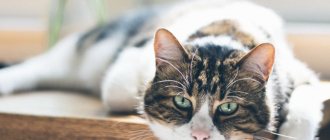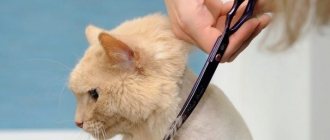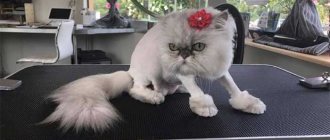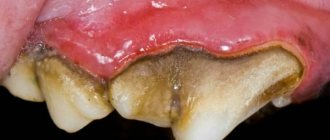Beautiful and noble British cats, dressed in plush fur coats, can leave few people indifferent. Their character is far from simple. But this does not at all reduce their popularity . How many years do British cats live, what is the lifespan of cats at home , these questions are of interest to many fans of the breed.
The British are distinguished by good health and good immunity, which is explained by their origin. With good care and subject to a number of rules, they can live up to 15-16 years.
What determines the life expectancy of a British cat?
| Proper nutrition | Must be correct, regular and balanced |
| Disease Prevention | Vaccinations |
| Treatment for parasites | Regular intake of medications against worms and ticks |
| Visit to the veterinarian | Regular inspection |
| Weight control | The British have a tendency to be overweight, strict control over this is needed |
| Control over the reproductive function | If breeding is not planned, castration or sterilization will be required |
| Activity | Physical activity required |
| Conditions of detention | Good care and good hygiene |
| Provoking situations | Avoid stressful situations |
How to extend the life of a Briton
There are certain rules of care, if you follow them, the animal can live a long life. Otherwise, even the healthiest cat will not live longer than 5 years. The lifespan of a person directly depends on the conditions in which he lives.
If a cat lives in a house, then it can live to an old age. Domestic fluffies delight owners from 12 to 17 years old. However, the exact lifespan depends on many circumstances. Outdoor cats live much shorter lives. No more than 5 years.
Medical care for the British
The British inquisitive animal lives with an interest in everything it finds in the apartment, independently exploring the space available around it. With this active life, the cat can get into a dangerous situation and cause harm to health. First aid to a cat is provided urgently; the life and health of the pet may directly depend on this.
Your cat will need medical intervention in the following situations:
- Poisoning causes serious consequences:
- Ingestion of spoiled food or chemicals into the stomach;
- inhaled toxic substances in the air;
- licked off harmful adhesion from the surface of the wool.
- A foreign object has gotten inside.
- Electric shock.
- Chemical or thermal burn.
- The presence of heavy bleeding.
Vaccinations
The purpose of vaccination for the British is to protect the body when affected by infections. Animals are vaccinated according to the approved calendar.
Attention! It is a myth that a home-bound Briton who does not leave his apartment does not need to be vaccinated. He can catch the infection from household members.
The first vaccination for the British against infection with microsporia and trichophytosis is given to 2-month-old kittens. A subsequent booster dose is given at 10 weeks of age. In the future, vaccination is carried out annually. 9-12 week old kittens are vaccinated against:
- calcivirosis;
- rhinotracheitis;
- chlamydia;
- Panleukopenia;
- Rabies;
After 11-16 weeks, revaccination is scheduled, and then annually. At 16 weeks, the infectious peritonitis vaccine is administered with a booster dose at 20 weeks. This is the last vaccine, the others have an annual schedule.
Vitamins
The British cat will grow healthy, strong, with fluffy hair when vitamins and microelements are added to the diet. Properties of vitamins on the animal’s body:
- Strengthens physiological processes;
- Protect the body from environmental influences;
- Increases immunity to infections and microbes;
- Speed up the healing process.
- Properties of minerals on the animal body
- Accelerate metabolism
- stimulate proper growth,
- influence development, reproductive function,
- improve the general condition,
- Increases immunity to diseases,
- They have a strengthening effect on all systems of the body: muscular, bone, circulatory.
Attention! Before adding vitamins and microelements to a Briton’s diet, consult a veterinarian.
The correct lifestyle of a British cat
Genetically, Britons are prone to a number of diseases. First of all, to excess weight. You need to provide your pet with a calm environment. Stressful situations are strictly contraindicated for these cats. It is necessary to give phlegmatic pets the opportunity to move. Because they need to expend accumulated energy.
You need to play with your pet and stimulate its mobility. To do this, you need to purchase toys and deal with the handsome plush.
Nutrition
The lifespan of a Briton directly depends on the quality of food. To create the right menu, you need to take into account several nuances:
- For what purpose was the animal purchased (for the “soul” or to produce offspring).
- Age category;
- Feature of this breed.
Proper nutrition for a British cat
British cats are quite large by nature. Adults, especially males, can reach a weight of more than 6 kg. Females are slightly smaller. In size, they are slightly inferior to Maine Coons and other large cats.
The disadvantage of this breed is its tendency to gain weight. This problem is especially encountered by cats after castration. That is why you should choose your diet carefully.
You need to decide on the type of food. Mixing several types of food, for example, dry and natural, is strictly not allowed. This can lead to stomach diseases. Don't get too carried away with fish. Representatives of the breed are predisposed to diseases of the excretory system.
The diet should be balanced. Fatty foods are excluded. Meat, a small amount of fish, boiled vegetables and cereals, as well as dairy products are welcome.
Conditions of detention
Plush fur should be brushed regularly with a special comb. It is especially important to carry out this procedure during periods of active molting.
You need to keep your ears and eyes clean. It is recommended to clean your ears every two weeks. Rub your eyes regularly.
If walks are planned, then the owner's accompaniment is mandatory.
Conditions for keeping a British cat
Bathing and hygiene
Don't bathe your cat too often. This may damage delicate skin. In case of severe contamination, water procedures are carried out using special shampoos. The water should be cool. It is very important to secure your pet so that water does not get into the ears. In order not to provoke otitis media.
Physical activity
The British have a strong immune system and a thick, plush coat. Therefore, they can and should be walked outside (subject to vaccinations) at normal temperatures. In urban conditions this is problematic, there are too many cars and stray dogs.
Disease Prevention
You should carefully monitor the ears, fur, mouth, and eyes. To avoid serious diseases, cats are given anthelmintic drugs twice a year. The first vaccination is given at three months of age. Then annual vaccinations are required against common infectious diseases of cats (chlamydia, rabies and others).
You can avoid serious illnesses by regularly taking your pet to the veterinarian.
Castration (sterilization)
If further breeding of British cats is not planned, then such an operation is desirable. The inability of a pet to lead a full life does not have the best effect on its health.
As for age, the British reach sexual maturity at 7-9 months. After the first heat, the cat can be spayed.
Castration of a British cat
Psychological well-being
The character of the British is very specific and this must be taken into account when choosing this breed. For a plush cat, people are more likely to be service staff. He will not pester them with his caresses or attempts to climb onto his lap. Rather, on the contrary, the pet will resist the intrusiveness of the owners in every possible way. The appearance of a noisy company will be extremely stressful for him.
A stressful situation for him will also be the fact that the owner, for example, was late at work and did not return home on time. Only selected people will allow the cat to scratch itself behind the ear. The British are tolerant of children, but they are completely unsuitable as a living toy.
How long do Scottish Fold cats live?
Cats of the Scottish breed or Scottish Fold stand out among the cat tribe not only by the unusual shape of their ears. The undoubted advantage of these lop-eared cats is their calm and easy-going nature; they are very affectionate, but not annoying. There is another important fact that contributes to the growth of their popularity. Among the cat tribe, Scottish Folds are considered long-lived, existing next to humans and giving the joy of communication for more than ten years.
The first fold cat appeared in 1961 in Scotland. She became the ancestor of all folds, obtained by crossing her descendants with British Shorthair cats.
Scottish fold cats and male cats are different:
- medium sized rounded body and head with a strong build;
- thick massive limbs with large pads;
- small ears rounded down;
- large round and expressive eyes of stunning shades;
- thick, short and soft, like velor, coat of various colors.
Scottish Fold cats have good health at the genetic level. This is the basis of their longevity.
At home, Scottish Fold cats live 15-20 years
In good conditions, surrounded by care and attention, they are able to live longer than the average. To create such conditions, animal owners need to know the “weak” points of the breed and be able to correct them.
Like any other cat breed, Scottish Folds have their own “weaknesses”:
1. Despite the outwardly strong skeleton, cats of this breed have a rather vulnerable skeletal system. With the exception of congenital anomalies, and there are such, problems with the growth of bones and cartilage do not appear immediately, but as the animal grows older. In most cases, they can be solved, but they negatively affect the life expectancy of a pet. 2. A balanced diet will help prevent the occurrence of another problem of this breed - the tendency to be overweight. It is provoked by a lack of protein in food, an abundance of carbohydrates and the animal’s excellent appetite.
Therefore, it is so important to monitor your pet’s diet, adjust it if necessary, and monitor the animal’s height-to-weight ratio. 3. Scottish Folds love being brushed.
This procedure not only improves the mood of your furry pet, but also prolongs its life. Being the owner of thick fur, it is difficult for Scottish Folds to clean or lick it on their own. The wool becomes matted, forming tangles. In advanced cases, tangles impede the animal's movement, causing physical inactivity, and, as a result, lead to an increase in body weight. Excess fur, entering the stomach, forms into dense lumps. They are difficult to remove from the digestive tract and provoke disturbances in its functioning. Timely combing, especially in combination with bathing, will reduce the risk of digestive diseases and make the coat of lop-eared pets well-groomed and beautiful. 4. The special structure of the ears obliges owners not to forget about their hygiene. It seems that the ear holes are securely covered. However, dust, dirt, and sometimes insects, such as mites, freely penetrate the ear canals, clogging and causing discomfort, followed by disease. Fold-eared cats need careful ear hygiene. It should be done no less often than for cats with regular ears.
Fold kittens are born very small, they weigh only 100 g. Raising a kitten will be much easier if you buy a healthy baby. A careful examination of the animal and observation of its behavior will help you make the right choice.
It is recommended to purchase Scottish Fold kittens at the age of 2-3 months. By this time, their body has fully formed and is strong enough to endure the move and successfully adapt to new conditions.
To reduce the risk of problems with the skeletal system, when choosing a kitten, you need to examine its paws and tail. The joints of the limbs should be mobile, easily bend and unbend without causing negative emotions on the part of the animal
It is also necessary to pay attention to the quality of the coat, the cleanliness of the tear and ear canals
How to extend the life of British cats
So, in order to enjoy your plush, self-sufficient and self-satisfied handsome man for as long as possible, you should take proper care of him. Get vaccinated, visit a veterinary clinic for timely health monitoring, and give him the right diet.
Regular and timely prevention of diseases in cats
It includes preventive vaccinations, treatment against parasites and ticks.
Proper feeding
Natural food or ready-made dry food is suitable for feeding your cat. The diet must be properly composed and provide the pet’s body with everything it needs. You should not combine two types of food. It's better to stick to one thing. Either dry food or natural food.
Hygiene and care
Regular pet care is required. Ears and eyes should be kept clean. If necessary, the pet is bathed with special shampoos. Comb out the fur.
Education and exercise for a cat
You should pay attention to raising your pet from the very first day in the house. An important point is to train the cat to relieve itself in the litter box. It is worth remembering that these animals are very clean. Therefore, after each visit, the toilet is thoroughly cleaned and washed.
If your pet doesn’t like the quality of cleaning, he will find a more suitable place himself!
Important educational moments include learning to use your own name. You should not allow your pet to climb on the table and steal food.
To maintain a slim figure, the cat needs active games.
Limiting stress factors
If you plan to have a noisy company in the house, then it is advisable to provide the cat with a calm and secluded place. At the same time, you should not leave her alone for a long time. You should visit your pet regularly and provide food and water. For all his independence, the Briton is very attached to his master.
Sterilization and castration
They are necessary if you do not plan to breed cats. The optimal age is after 9 months, when the pet becomes sexually mature.
What can you do?
Many owners who, of course, love their furry friend can help ensure a long and happy life.
If you want this, then follow some of the rules below:
- Everyone needs fresh air! Therefore, periodically walk your pet, let it out onto the veranda or balcony;
- the British need grass, vitamins and various food additives;
- active life! Play with your animal more often, give him the opportunity to run and jump, as much as he wants;
- quality nutrition should come first! For such purebred cats, be sure to buy expensive premium food.
So, let's go into more detail. In order for your kitten to have a rich and long life, he needs fresh air. His immunity will be strengthened when he can breathe fresh oxygen.
Being active is also good for the lives of animals. Therefore, owners and all household members should play with their British cat. Balls, ropes, lasers and other objects will help you with this. You can build shelves against the wall that will help your pet climb heights in your home.
Good quality fresh water and food contributes to a cat's longevity. Therefore, you should often wash and change bowls, buy fresh and high-quality products. If the owners decide to feed the British cat breed with natural food, then it is worth buying lean meat.
For their diet, chicken or beef is best suited. If the owners of a kitten want to feed it dry food, then they should buy those specifically designed for the British breed. Typically, such high-quality food comes in slightly smaller sizes than others.
And this is due to the fact that this breed has flattened and small jaws, so it is easier for them to chew small food. Or you can purchase wet food for this breed of animal.
However, remember that such food should be expensive and from a trusted company, because only such food contains vitamins, minerals and meat, which are so necessary for a healthy body.
It is also important for pets to receive various vitamins. There are many varieties of them, for example, for neutered cats, for improving coat, for strong bones and teeth, and so on.
Therefore, you can consult with a specialist at a pet store or with an experienced veterinarian to choose the best and necessary for your kittens.
By following the above guidelines and taking good care of your British cat, you can help him live a long and happy life!
Possible diseases of the British cat
This breed was obtained artificially. Representatives have a tendency to genetic and acquired. Since the British are closely related to Persian cats, they are prone to eye diseases. If fed improperly, pets may develop intestinal and stomach diseases. The article has already mentioned the tendency to be overweight. Careful weight monitoring is required. There is also a genetic predisposition to joint diseases. Another weak point is the heart. That is why the animal needs to be protected from stressful situations. Neutered cats often suffer from urolithiasis.
Possible diseases of the British cat
Castration and sterilization of the British
They are carried out when animals reach sexual maturity. What happens at seven months of age?
When to castrate a British cat
The best option is to castrate an untied cat at a young age. The most suitable age would be 9 months or 1.5 years. If the operation is performed earlier, the cat’s development will slow down.
Sterilization of British cats
If the question is when is the best time to perform such an operation, then the age of the cat will be the same as that of the cat.
Skin diseases
There is a fairly extensive list of skin diseases in cats. These include scabies and dermatomycosis. Fleas, mosquitoes and ticks, allergies are often the cause of eosinophilic granuloma. Hair lice and other parasites cause great suffering to furbabies.
Skin diseases of the British cat
The pet's belly hangs
The formation of a small skin fold in a British person may be normal. Scientifically, this fold is called the fat tail. It is worth observing the behavior of your pet. If he is active and has a good appetite, then there is no reason to worry. But if a hanging belly is associated with obesity, then it is worth reviewing the diet and putting the cat on a diet. If you have no appetite, you should be concerned and contact your veterinarian. The reasons for this phenomenon may be different.
When to castrate a cat
British cats are recommended to be neutered after 7 months. It is advisable that he does not have matings. By this age, his genital organs and associated systems have been formed.
At a later age, castration is possible, but some cats do not stop marking or showing interest in the opposite sex.
British people should not undergo surgery if:
- During illness;
- For obesity;
- In stressful situations;
- With reduced immunity;
- In case of intolerance to anesthesia.
There is no need for castration until 6 months of age. Rarely does puberty become fully apparent before this age.
